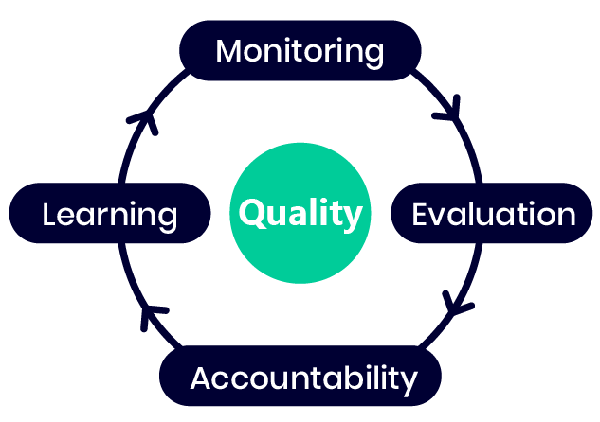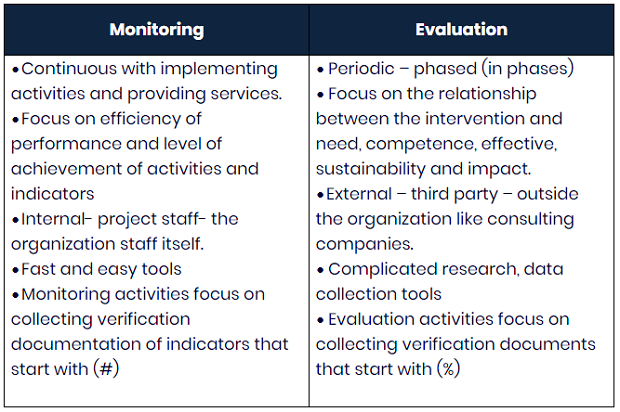Articles and How-to Tutorials for NGOs
Monitoring, Evaluation, Accountability, and Learning
Written by Adel SalahAll donors are interested in how competent the organization that submits the proposal is and the quality of its work. So there must be a part of the proposal that is written about the activities and procedures that will be carried out by the organization to ensure high quality project implementation.Therefore, it became customary for donors and different organizations that the applicant organization writes a paragraph in the proposal on the different quality components, which are monitoring, evaluation, accountability and learning.
Monitoring, evaluation, accountability and learning circle
Monitoring
Monitoring is all the tasks we perform to verify the quality of implementing project activities and through which we collect reports and documents that confirm that the activities have been implemented with high quality. Therefore, these documents are considered verification means for indicators that start with a number (#), as they contain information on the targeted beneficiaries in all project activities.
The main monitoring activities
Coordinate with the project team to make sure to write specific objectives of the indicator in the project plan.
Prepare different activities’ implementation criteria as stated in the project proposal.
Meet with the project manager and staff to familiarize them with required standards to implement each activity and provide them with a copy of these standards.
Prepare different report forms for all project activities with a list of attached documents of each report like statistics tables and deliver them to the project staff.
Collect and review reports to make sure of a full documentation of beneficiaries’ numbers, which is disaggregated by sex, age and geographical area.
Collect beneficiaries’ statistics weekly and monthly. Track the progress of activities and indicators on a monthly basis.
Track indicators’ achievement level Field visits to ensure activities’ implementation and commitment to targeting and quality standards.
Attend different events and activities to ensure quality implementation according to standards and provide feedback of positive and negative notes, along with suggested solutions to the project team.
Archive reports with their annexes in soft and hard copies and make sure that all means of verification for indicators are available according to what is stated in the logframe.
Evaluation:
Evaluation is the tasks and activities implemented by the project staff before, during and after implementing the studies or evaluations that contain clear answers for the indicators starting with (%).
The main evaluation activities:
Evaluation activities are the most important activities implemented by the organization, which are part of the responsibilities of the monitoring and evaluation officer to ensure the availability of the following verification means:
Preparing and implementing evaluations by an external party (third party):
Prepare the evaluation’s terms of reference.
Announce the need of a consultant online or send the terms of reference to the qualified and accredited consulting companies to ask for proposals to implement consultancy.
Form a committee to analyze submitted proposals according to the terms of reference, time period, budget and quality standards.
Participate in selecting a consultant or consulting company to carry out this evaluation in a competitive manner.
Contract with the consultant or the consulting company.
Review and approve the preparatory report of the evaluation or the study with data collection tools like questionnaires. It should be assured that all project indicators that start with percentage (%) are included in the evaluation. This means that there are questions that measure all the indicators that start with (%) are included in the questionnaire.
Coordinate for the consultant in the field during data collection.
Revise the evaluation’s draft report.
Approve the final copy of the evaluation.
The most important types of evaluations carried out by development and relief agencies before, during and after implementing projects are:
Needs Assessment.
Baseline Survey.
Post- Distribution Monitoring (PDM).
Mid- Term Review.
Final Review/ Final Evaluation.
End-Line Survey.
Impact Assessment.
Remember:
should be assured that all project indicators that start with percentage (%) are included in the evaluation. This means that there are questions that measure all the indicators that start with (%) are included in the questionnaire.
The aforementioned evaluations cannot be carried out in one project by any agency. Therefore, organization should not put any evaluation activity in case the project is small and doesn’t need an indicator that starts with (%). It is customary that projects with a budget of more than one million will need only final evaluation or in case the donor insisted to add a final evaluation. We shouldn’t forget to put an evaluation activity in the work plan and activities as well as add the evaluation budget.
The difference between Monitoring and Evaluation
Accountability
To simplify the meaning of accountability, we can say that accountability is the activities that reflect our responsibility. So we carry out procedures that ensure equality in accessing services or assistance with complete transparency, which also allow the project beneficiaries to contact us directly and deliver their views, suggestions and complaints. In turn, we contact them continuously to give them feedback for every complaint received.
Main accountability activities
Establish complaints and feedback mechanism for the project that are appropriate to the geographical conditions of the targeted area and type of intervention, and make sure of the beneficiaries’ knowledge of this mechanism.
Receive, record and analyze complaints daily then provide feedback to the management and beneficiaries.
Weekly or monthly Documentation of complaints and feedback reports.
Periodic discussion with the project team on how to improve the provided services based on the beneficiaries’ complaints and suggestions and related services agencies.
Call random beneficiaries of every activity – service- distribution.
Ensure that a complaint officer is appointed in all distribution committees, and then contact with them to collect complaints and provide feedback.
Print banners with instructions, standards and alerts that the assistance is free.
Print complainants’ phone number in every publication that will be provided to the beneficiaries.
Learning
Donors, relief and development agencies are interested in collecting information that helps them learn from their projects. Therefore, all monitoring and evaluation activities are implemented as part of learning activities:
Learning activities that should be implemented in all projects:
Prepare and document humanitarian and success stories; disseminate and share them with concerned parties and donors.
Document the lessons learned from the project.
Document the risks faced in the project and how the project team succeeded in dealing with them, include them in the project’s mid and final report.
Share learned lessons, risks and ways of dealing with the leadership of the organization, concerned departments and those responsible for writing project proposals to avoid them in future project plans.
Learning activities from evaluations that were carried out by an external party (third party):
Prepare appropriate comments and replies by project management on the evaluation report.
Prepare a learning plan: how will the recommendations mentioned in the evaluation report be utilized?
Hold a meeting by the project management or the organization with the concerned parties, relevant departments and staff to discuss the recommendations and their operational plan.
An example of the monitoring and evaluation paragraph in the proposal
The organization has a manual for monitoring, evaluation, accountability and learning, on which M & E officers depend for the preparation of the M & E plan, implementation of all field monitoring activities, verification of standards and high quality reporting. To ensure the quality of the implementation, the main staff of the organization along with the project team do the following:
- Prepare a plan of monitoring, evaluation, accountability and learning that is based on the project logframe with the participation of the project team and ensure that it is related to all interventions and activities to be implemented in the head office and target areas; ensure that all project indicators, target number and means of verification are understood by all project staff.
- Monitoring and evaluation officers will review and deliver the unified reporting formats to each project team and review the reports and ensure that they contain all the required information confirming that the activities have been completed as required, as well as conirm all supporting documents have been attached with the main reports of activities.
- Statistics of interventions in the field will be collected on a weekly basis and a summary of the achievement of each indicator will be compiled monthly and included in the monthly reports of the project.
- Establish complaints and feedback mechanisms suitable for the targeted areas and raise the beneficiaries’ awareness on how to file complaints and suggestions. Also activate and document complaints and feedback mechanisms continuously during the period of implementation of the project.
- Monitoring and evaluation assistant will be hired to work continuously in the targeted areas. Field visits will be conducted on a monthly basis to ensure that activities are conducted and that beneficiaries are aware of complaints and feedback mechanisms.
- We will select an external consultant to implement post-distribution monitoring (PDM) after distribution activities and make sure of the beneficiaries’ satisfaction on the assistance and services received.

